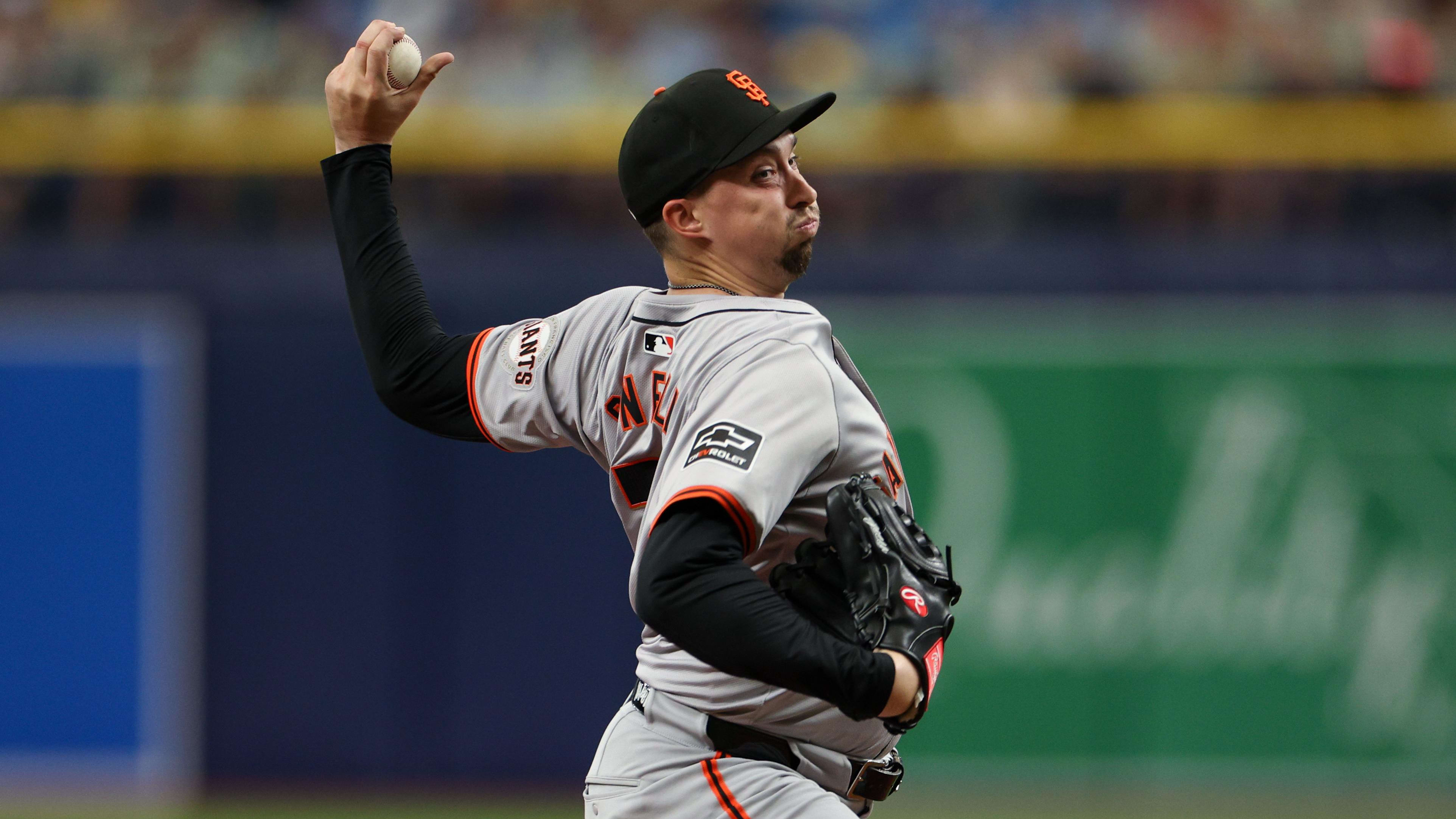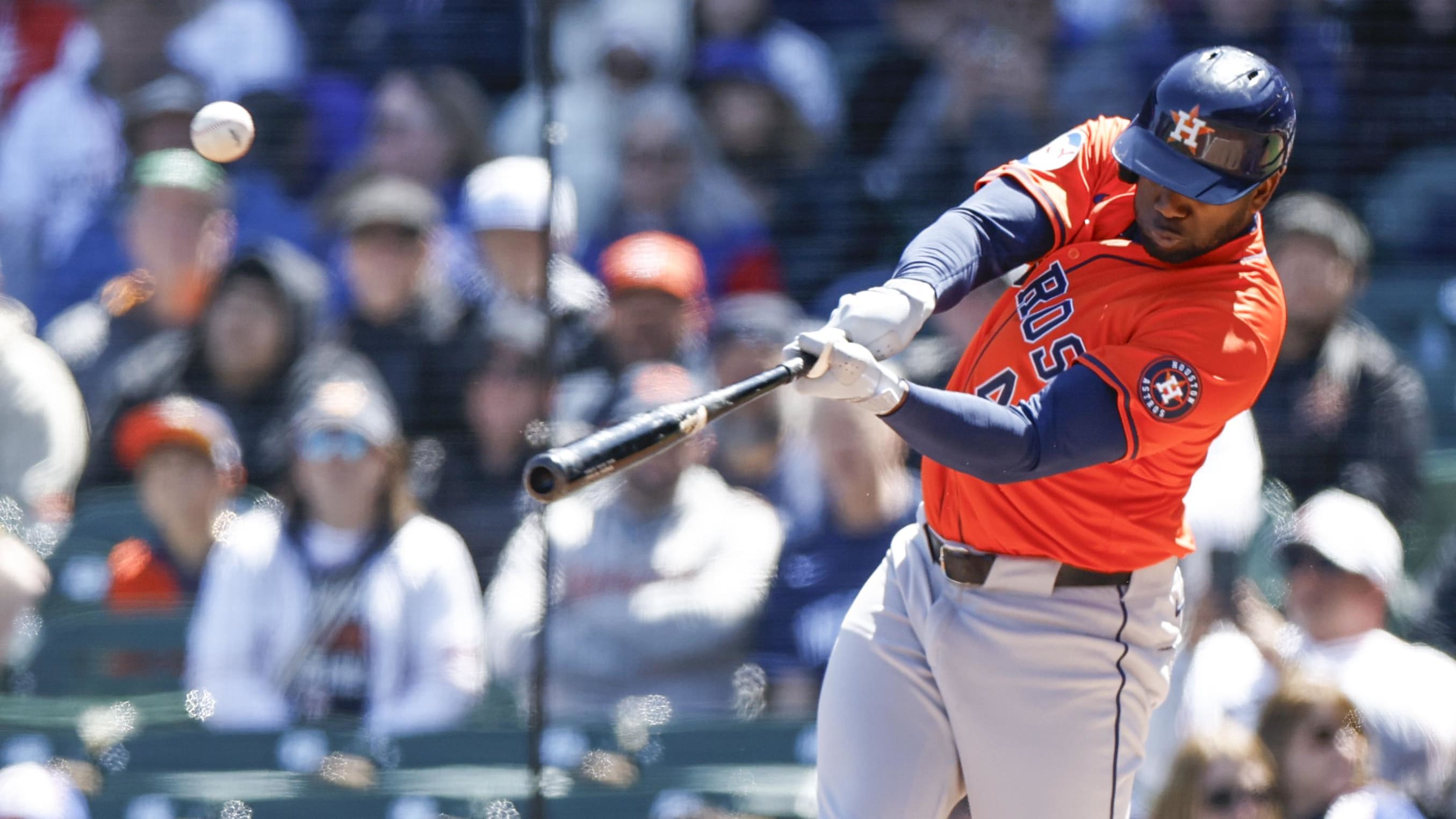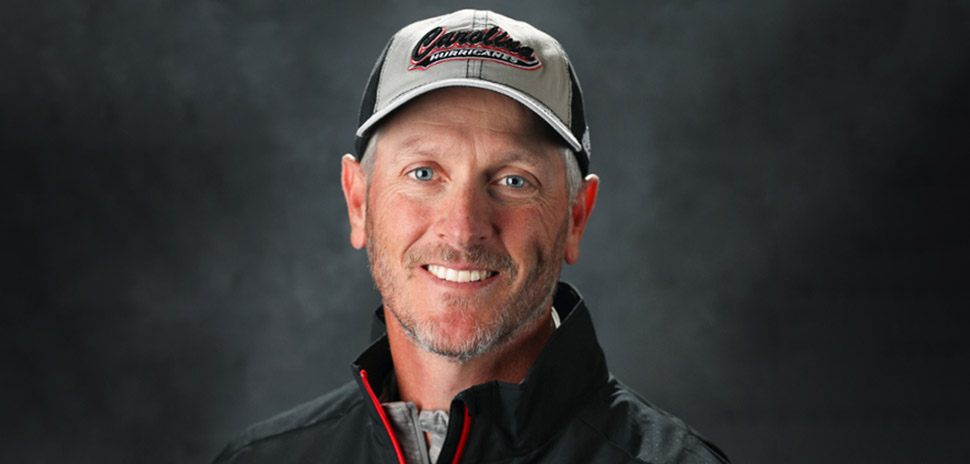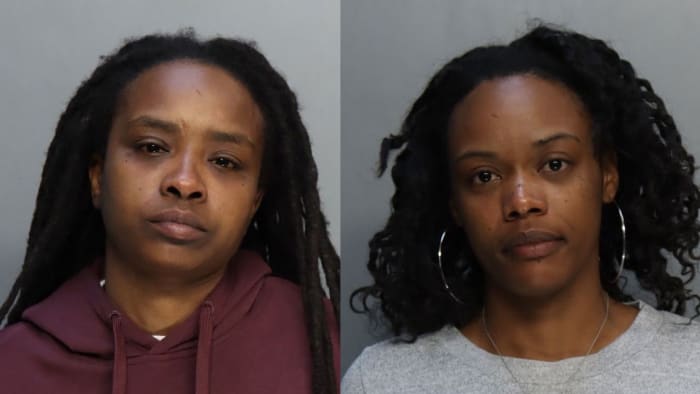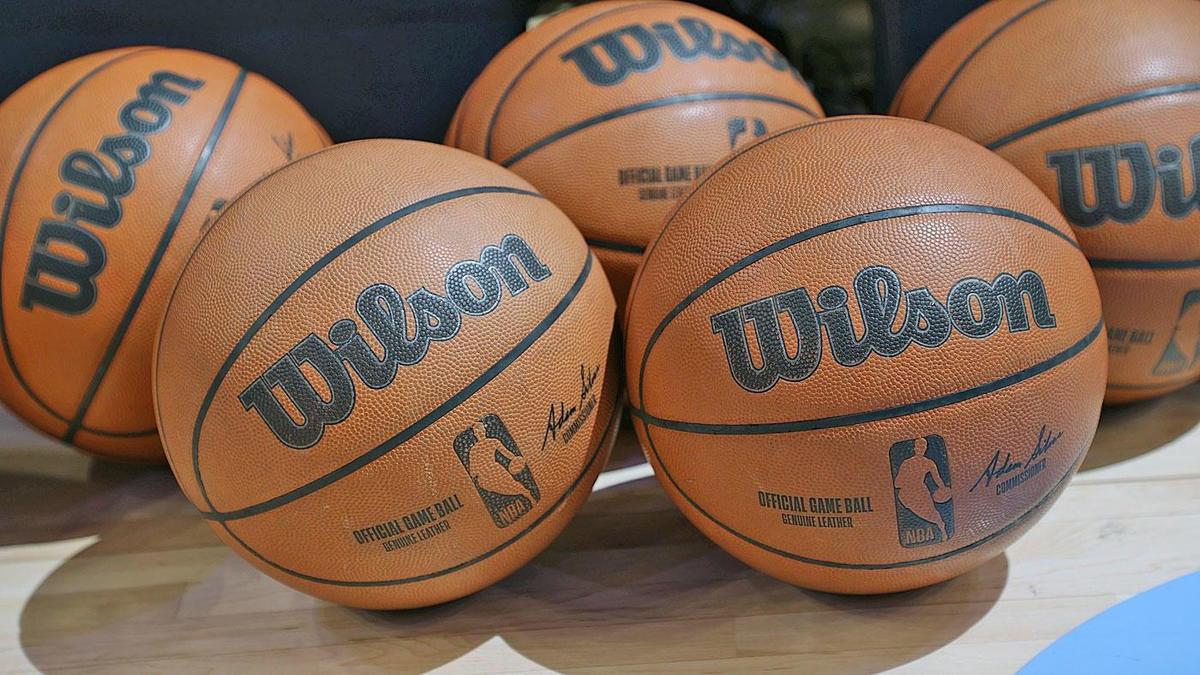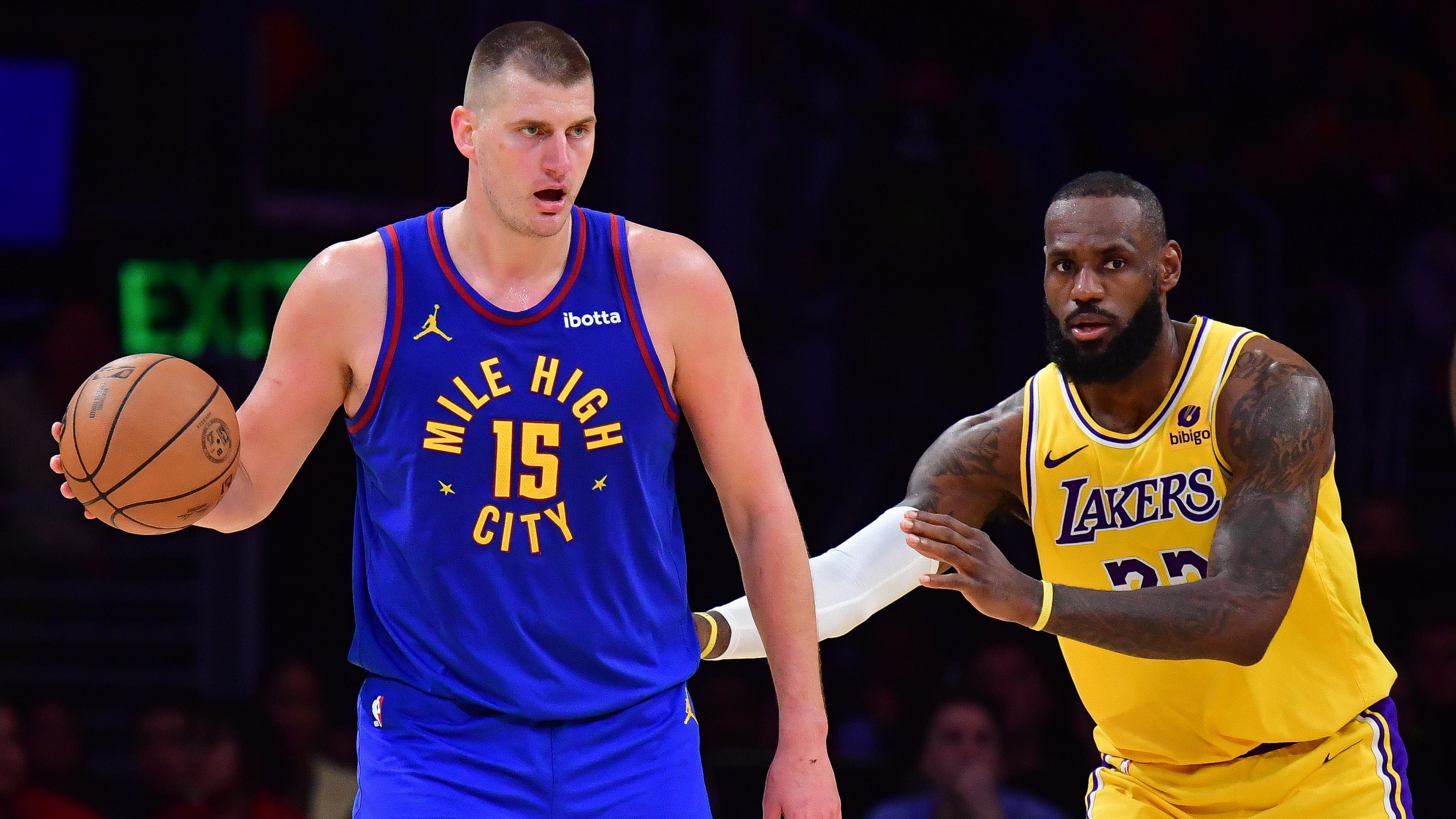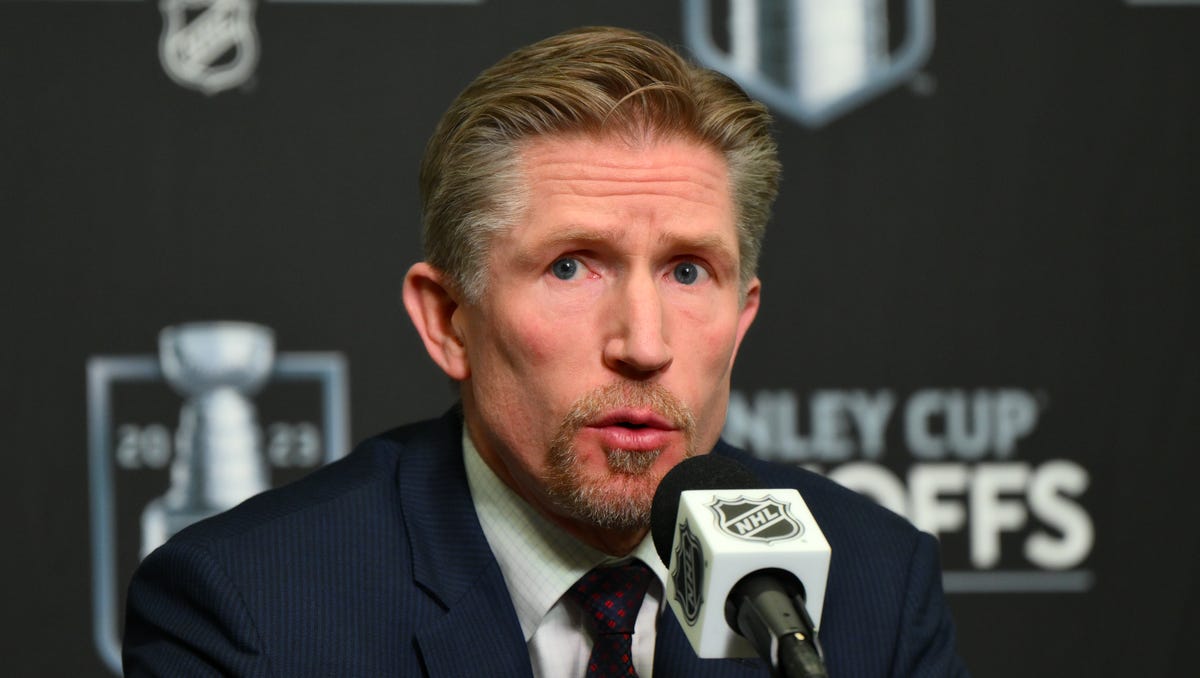Sports
A new group is buying up minor league baseball teams at a feverish pace. What's the end game?

WAPPINGERS FALLS, N.Y. — The artificial turf at Heritage Financial Park is new. So is the right-field wall that opens wide enough for an 18-wheeler to haul concert equipment onto the field. The party deck is sponsored by a brewery that’s 10 miles away, giant windows have been installed around the corporate event space overlooking left field, and the renovated home clubhouse, where the Hudson Valley Renegades dress before games, has two indoor batting cages flanked by state-of-the-art data and motion-capture technology.
This is Class-A baseball in 2024. Quirky and local, but also big business that’s booming. Minor-league attendance is up and approaching pre-pandemic levels, new ballparks are being built, and existing franchises are selling at what are believed to be record prices. These are not the wooden bleachers and potholed infields of old.
At the center of this transformation is Diamond Baseball Holdings, a three-year-old company that owns more than a quarter of all minor league clubs. From a ground-up franchise in Spartanburg, S.C., to long-established clubs in Louisville, Ky., and Lansing, Mich., to their most recent purchase of the Harrisburg Senators in Pennsylvania, Diamond Baseball Holdings (DBH) now owns 32 of 120 affiliates, and its founders said they are still “aggressively in acquisition mode.”
“We are agnostic to geography. We are agnostic to club affiliation,” executive chairman Pat Battle said. “If you’re one of the 120, we are interested.”
The DBH portfolio has grown at a rate, and to a size, that would have been impossible five years ago. It is a byproduct of Major League Baseball’s 2020 takeover of the minor leagues, which yanked affiliated baseball out of more than 40 communities and shifted minor league control to the MLB office. Commissioner Rob Manfred’s “One Baseball” initiative seeks to put every aspect of the game under one umbrella — that of the major league team owners — from Yankee Stadium to the Little League World Series, and all things in between.
In the middle of that plan is DBH, co-founded by former college sports licensing executive Battle and longtime minor league owner Peter Freund, and financially backed by private equity investment firm Silver Lake.
“We felt like, man, if we have Major League Baseball aligned with minor league baseball really for the first time ever, this could be an unbelievably exciting time to do it,” CEO Freund said.
Beyond its ownership role, DBH has a strategic partnership with MLB to help negotiate national sponsorships and branding opportunities on behalf of all minor league franchises, and it also plays a role in consumer product licensing for all 120 teams.
Major League Baseball declined to speak on the record about DBH, and some minor league owners did as well, noting that both Freund and Battle are close with Manfred. The owners who did agree to talk about DBH said it has paid good prices for teams and seems to run them well — it’s largely retained local staff and invested in communities. Yet there are concerns about its outsized influence in a rapidly evolving industry, and whether minor league baseball — long considered a hyper-local, mom-and-pop enterprise — can thrive within a massive corporate structure.
“They think they can be a little more efficient, and maybe they can,” one former owner said. “But, again, MiLB is very local. You kind of need the people you need there to sell and all the stuff that has to be done on the ground. They can’t do that corporately.”
There is also some worry that given DBH’s size and reach it could impact MLB’s decision-making in the future, especially as some minor league owners fear that further contraction of teams and even greater MLB control could be in the works.
“On the one hand it is tremendously beneficial that DBH has a say because MLB can’t come in and push 120 teams around,” said one longtime minor league owner who, like some peers interviewed for this story, was granted anonymity so that he could speak freely. “However, the biggest fear that we have is that as we approach the next (minor-league contract) in several years, DBH has such influence, and the teams themselves are just a small part of DBH/Silver Lake’s overall involvement, that it’s conceivable MLB could hurt the minor-league teams to the benefit of other areas.”
From a suite overlooking the renovations at Heritage Financial Park, Freund and Battle insist those concerns are unfounded.
“Whether you’re a DBH team or not, we’re all in this together. And we do believe a rising tide lifts all boats. If a non-DBH team has success, it’s great for minor league baseball, and we celebrate that,” Battle said.
Locations and Major League affiliations for minor league teams owned by Diamond Baseball Holdings.
For more than two decades, Battle built the Collegiate Licensing Company with his father, Bill Battle. CLC acquired the licensing rights to more than 200 universities, conferences and bowls before, in 2007, being acquired by IMG to form IMG College. Battle served as that company’s senior corporate vice president and chief executive for three years.
College sports are big business, but their epicenters are not New York and Chicago. They’re in Ann Arbor, Mich., Boulder, Colo., and Tuscaloosa, Ala.
“I think MLB sees in us people who really understand Scranton and Des Moines,” Battle said. “They’re not the 30 major markets, but they’re real markets, and very important communities in this country.”
Battle briefly held an ownership stake in the Augusta GreenJackets and said he was “reading with interest” in 2020 as Major League Baseball took over the minor leagues and introduced a significantly different Player Development League (PDL) structure. Affiliates signed 10-year PDL contracts. Higher and often expensive facility standards were put in place. Affiliations shuffled and levels changed. Short-season leagues were eliminated. Three previously independent teams became affiliates, and 43 minor teams lost affiliation (many of them because their facilities were deemed insufficient). Minor-league operations moved out of the MiLB office in St. Petersburg, Fla., and into MLB’s headquarters in New York.
It was a radical, and hostile, takeover in the eyes of many.
While some owners felt a rug pulled out from under them, Battle saw a platform being raised. Many minor-league teams had long ago stopped being mom-and-pop operations. Now with Major League Baseball pushing to further modernize the business model and doing more to promote its prospects — among the new facility requirements was the ability to stream in high definition — Battle recognized an opportunity.
When Battle approached the league office, MLB not only offered reassurance he was reading the tea leaves correctly, the league connected him with a willing partner who had deep baseball connections.
“They saw it as a significant investment in minor league baseball,” Battle said. “It’s exactly what they were looking to do themselves, and within a week or two, I received a call from the commissioner’s office saying you need to meet Peter.”
As a longtime minor-league owner of the Memphis Redbirds, Charleston RiverDogs and Williamsport Crosscutters, Freund was an insider. He was friends with the other owners, familiar with the league office, and had been working with the commissioner’s office to enact the restructuring.
“This was (MLB’s) opportunity to really take this thing and bring it up to the next level,” Freund said.
In October 2021, Diamond Baseball Holdings was born — Battle came up with the name, a reference to a diamond in the rough — and in December 2021, backed by their Silver Lake capital, DBH announced an initial acquisition of 10 minor league teams. It added 11 more between December 2022 and June 2023, and three in the past few weeks.

Peter Freund, left, and Pat Battle started DBH in 2021 and they now own 32 minor league baseball teams. (Courtesy DBH)
“If you had asked me in 2019 if this scenario was even possible, I would have said you’re crazy,” said longtime Iowa Cubs general manager Sam Bernabe, whose franchise was among the first DBH bought. “Nobody would have that kind of interest in that.”
Under the old structure, various minor leagues existed as independent entities. Each worked with Major League Baseball, and no one was allowed to own multiple teams in a single league. MLB’s takeover eliminated that rule — because those leagues began to exist in name only — which cleared the path for DBH and its deep pockets.
MLB’s takeover coincided with the COVID-19 pandemic, which wiped out the 2020 minor league season. Even the franchises that survived contraction faced lost revenue and massive uncertainty. Some owners saw DBH as a lifeline.
“They just came in and offered a lot more than we were (expecting) to get, honestly,” said a former owner who sold to DBH.
Other owners shared DBH’s optimism and refused to sell, believing they too could capitalize on this bright new future.
“We’re all making money,” said Larry Botel, who has an ownership stake in three minor league teams. “We’re all taking advantage of what MLB is offering us.”
DBH developed a reputation for buying teams at the high end of perceived value. Even if that had not been the case, it would have been difficult for DBH to swoop in and undercut vulnerable owners, as every sale has to be approved by the league office and pass inspection by an executive board made up of four Major League owners, four minor league owners and an independent ninth party. DBH does not have a seat on the board.
DBH acknowledged some skepticism around minor league baseball when it began buying teams, but Freund and Battle believe they’ve won over most owners.
“There were a lot of teams running their business like it’s 1975,” one current minor league owner said. “My hope is that (DBH’s) expertise in sales and marketing will elevate all the teams.”
DBH owns 20 teams at the Triple-A or Double-A level. It owns all four Atlanta Braves affiliates, three from the Boston Red Sox, and one or two from roughly two-thirds of all major league clubs. Two player development executives for MLB clubs with affiliates under the DBH banner described DBH as knowledgeable and easy to work with. “Very organized, very professional, asked all the right questions,” one said.
Not every minor league franchise sold in the past three years has wound up in the DBH portfolio. The Sacramento River Cats — Triple-A affiliate of the San Francisco Giants and one of minor league baseball’s most valuable franchises — sold in 2022 to the group that owns the NBA’s Sacramento Kings. The Goldklang Group, which has long-standing connections with Freund, sold two of its franchises to DBH but held onto another. Chuck Greenberg, who owns three minor league franchises, has kept those.
“There’s a lot of positive energy around MiLB right now that would have been difficult to foresee just a few years ago,” Greenberg said.
After taking over a team, the DBH playbook typically involves minimal surface-level changes (except in cases like Hudson Valley, where Heritage Financial Park needed significant renovation to meet the new facility standards). When DBH recently purchased the Winston-Salem Dash and Inland Empire 66ers, each news release stated that all existing staff would remain with the teams. That’s been the norm. DBH has never replaced a general manager upon acquisition. Two of its teams have rebranded — each one dropping the name of its major league affiliate in favor of something more local — and DBH announced plans to relocate two franchises: the Down East Wood Ducks will play out the 2024 season in Kinston, N.C., and then uproot to Spartanburg, S.C. The Mississippi Braves will move in 2025 to Columbus, Ga.
DBH said community connection is one of the first things it considers when evaluating a potential purchase, but it’s also crucial that facilities have a path to PDL compliance. Kinston’s Grainger Stadium is one of the oldest in the country, and Freund said DBH felt it would be nearly impossible to modernize that facility, so the company bought the team intending to build a new ballpark in downtown Spartanburg.
Tyson Jeffers, the incoming general manager in Spartanburg, transferred from the DBH-owned Hudson Valley franchise and has done everything from setting up a post office box to making connections with community leaders. Jeffers has more than a decade of minor league experience, and the difference with DBH, he said, is that everything moves faster.
“And a lot of that has to do with financials,” he said.
According to Freund, DBH has purchased 12 new video boards in the past year. They’ve bought in bulk everything from stadium lights to grounds crew tractors. When the Memphis Redbirds’ playing field fell into disrepair last season, DBH brought grounds crew members from its Springfield, Mo., and Des Moines, Iowa, affiliates to help fix it.
“You can standardize virtually every aspect of the business and still maintain that hyper-local (element),” Battle said.
Standardization and hyper-local should conflict, but DBH aims to standardize under the hood while keeping the surface-level idiosyncrasies that make minor league baseball unique. Diamond can slather the same nacho cheese across 30 franchises but still carve out space for Rendezvous BBQ in Memphis, Tenn., to provide the nachos at AutoZone Park. Same for Paul Cerda’s churros in San Jose and the Table Talk Pies in Worcester, Mass.
“It’s endless what you can do from an economy and a scale standpoint,” Freund said.
DBH is also working to finalize a strategic merchandising partnership with Fanatics, which DBH said will improve in-house retail service for select clubs by adding variety and improving the ability to replenish stock.
DBH does not own any of its ballparks. A vast majority of minor league teams play in community-owned stadiums and lease the venues. Many teams pay a flat fee to operate the stadium year-round. A minor league season guarantees no more than 75 home games, leaving at least 290 open dates. “The non-baseball might be our biggest opportunity to activate these ballparks,” Freund said.
The growth and reach of DBH has some people in minor league baseball pondering the amount of power one ownership group should hold in this evolving landscape. DBH came into existence not only with private equity money, but with a “strategic partnership with MLB for commercial rights.” The league has other people working on national sponsorships for minor league baseball, but DBH has a contract to do that as well (the group signed Oatly as the Official Oat Milk of Minor League Baseball). DBH also has a contract to help grow the licensing program and overall consumer products business across all 120 teams.
“From a national sponsorship and a national consumer products perspective, we definitely wear an MiLB hat,” Battle said. “And then as we conduct our business on ticketing, merchandising, locally at our venues, we’re wearing a DBH hat. We don’t see that as conflicted in any way.”
Other minor league owners expressed little concern about DBH filling national roles because, they figure, someone is going to be paid to find and maximize those opportunities, and DBH seems to be good at it. There’s little sense that national rights are going to be the primary driver of financial success, anyway.
“Maybe there’s an extra 10 to 20 percent revenue that will come out of this more nationalized, institutional type of approach,” Botel said. “But if you ignore the local, you’re gonna lose money. You’re gonna get creamed.”
DBH said it largely agrees with that notion. “Community is really critical for us,” Freund said.
But what does Major League Baseball consider critical?
The current PDL contracts expire after the 2030 season. Some minor-league owners expressed concern that, in seven years, MLB could further contract the minor leagues, removing the affiliation of another 30 teams — leaving three levels per Major League organization — and again raising the standards so that smaller operators will have a harder time meeting the requirements.
“We’re worried about getting squeezed out,” one minor league owner said.
DBH said it doesn’t expect or even want further contraction — the Williamsport Crosscutters, which Freund owns, were among the teams to lose affiliation in 2020. Contraction might also be more difficult now that minor league players are members of the powerful MLB Players Association, which will surely fight against the loss of hundreds of jobs.
There is also the question of what Silver Lake, the private equity money behind DBH, hopes to gain from all of this.
“Private equity is probably bad for everything except for the people that they’re buying things from, and I have a larger concern for baseball elsewhere,” one owner said. “But I think (Battle) is better at what he’s trying to do for minor league baseball than anybody.”
Some in baseball speculated early on that DBH/Silver Lake were gathering teams to bundle and re-sell as a package. A spokesperson for the private equity firm called DBH a “compelling opportunity” and said: “Silver Lake’s investments are commitments to long-term partnerships, and we are supportive of DBH’s continued work to nurture the evolution of minor league baseball while celebrating the unique culture and feel of each club.”
Freund and Battle said they’ve never discussed selling. “There’s just too much ahead to even think about that,” Freund said.
Any sale of the DBH portfolio would have to be approved by Major League Baseball, and few in minor league baseball think DBH is acting without a general understanding of what MLB might do.
Said one former owner who sold his franchise to DBH. “Nobody else would be doing this if they didn’t have some understanding of what Manfred wanted, or at the very least, his blessing.”
— Additional reporting by The Athletic’s C. Trent Rosecrans.
You can buy tickets to every MLB game here.
(Illustration: John Bradford / The Athletic. Photos: Nic Antaya / Getty; Rich Schultz, Zachary Roy, Rich Schultz / The Boston Globe)

Sports
Tennis: Can Kasatkina trust 'assurances' from Saudi Arabia? Is injured Alcaraz better?

Welcome to the Monday Tennis Briefing, where The Athletic will explain the story behind the stories from the last week on court.
This week, the coveted Masters 1000 in Madrid ran its first week and the stories on court were matched by the drama off it, as the Grand Slams and tennis tours continue their beauty pageant for the future of the sport.
If you’d like more tennis coverage, please click here.
Can ‘assurances’ on player safety in Saudi Arabia ever be enough?
Daria Kasatkina, the highest ranked openly gay player in women’s tennis, was asked Sunday how she felt about the WTA opting to hold its Tour Finals for the next three years in Saudi Arabia, a country, where homosexuality is a crime that can be punished by death.
Only the top eight players qualify for the Tour Finals. Kasatkina is currently world No 11.
“Look, if I qualify, it means that I’m top eight in the world,” Kasatkina said after advancing to the round of 16 in Madrid. “It’s great news for me.”
Kasatkina has been one of the most prominent voices on Saudi Arabia’s incursion into the sport (Patrick Smith/Getty Images)
Then she took a deep breath. “We see that the Saudis, now they are very into the sport. They want to develop the sport, and as long as it gives the opportunity to the people there and the young kids and the women, too, you know, we see that sport and specifically tennis, it’s actually so close so that they can watch it. They can play, they can participate in this, I think it’s great.”
Asked how she thinks the environment would be for gay players and those in same sex relationships as she is, and whether she has received assurances about being able to perhaps, share a room with a partner, Ksatkina once more paused pensively.“I’ve been given assurances that I’m going to be fine,” she said.
Does it matter if Aryna Sabalenka wants to watch men’s tennis?
Sabalenka caused a bit of a stir last week when she told a Spanish media outlet that she doesn’t watch much women’s tennis and prefers the men’s game, saying it was more interesting. That wasn’t the kind of buzz the women’s tour is looking for from its top players.
Sabalenka clarified those comments after winning her first match in Madrid, explaining that sitting down to watch her opponents isn’t how she prefers to spend her free time.
“I play against all of them, and I just want to change the picture, and because I watch lots of women’s tennis before I go to the match, I watch my opponents, I watch lots of women’s tennis,” she said. “It’s not like I don’t like it or I try to offend what I do. I was trying to say that because I’m playing there and it’s too much for me, I’m trying to watch men’s tennis. It’s more fun than watching probably my future opponents in the tournament.”
A perfectly understandable explanation. Tennis, and watching it, is work for the top players in the world, men and women. Baseball players don’t watch much baseball in their free time.
(Full disclosure, this can be true for tennis writers, as well.)
It’s a sensitive topic around the tour, especially because it wasn’t long ago that Amelie Mauresmo, the French Open tournament director and a former world No 1, described men’s tennis as more appealing to justify her decision to let men dominate the tournament’s nightly featured match.

Expecting women’s tennis players to be sole defenders of their sport is not realistic (Martin Keep/AFP via Getty Images)
Women have enough of a problem with men degrading their sport. Fairly or unfairly — probably the latter — that forces them to be extra careful when talking about their favorite versions of the sport. No one gets on Daniil Medvedev or any other male player when they fess up to not watching their sport unless they are in the middle of a tournament.

GO DEEPER
Listening to women: The slow rise of female tennis coaches
Has an arm injury actually helped Carlos Alcaraz?
Few things worry the tennis world more than the health and wellbeing of Carlos Alcaraz. His magical play and dynamic style have captivated tennis fans and the rest of the sports-consuming public. He is one of those players who comes along not so often and transcends the game, providing an opportunity for tennis to break through the morass.
He also gets hurt a lot, and has missed some medium-sized chunks of his early seasons as a professional that have cost him a chance to play in important tournaments — the ATP Tour Finals in 2022 and the Australian Open in 2023 top that list.

GO DEEPER
Carlos Alcaraz is making magic again. Watch out.
So it was a little alarming when Alcaraz pulled out of Monte Carlo and Barcelona this month with an injury to his forearm. Competing in Madrid was touch-and-go until his final practice the day before his first match, which he played wearing a sleeve. His performance, a near-flawless 6-2, 6-1 win over Alexander Shevchenko of Kazakhstan, eased a lot of worries, but it also showcased another side of Alcaraz, who said he never went for broke on his cannon forehand to protect his arm.
“I hit it softer than I used to, but it helped me stay relaxed,” he said. “I think more.”
The data (below) shows that Alcaraz is hitting it softer (a three-mile-per-hour difference might not seem like much, but over 78 feet, it’s a lot) and with “less quality,” but he’s still winning.
Far be it for anyone to criticize the play of a two-time Grand Slam champion at 20 years old, but if there has been a weak spot for Alcaraz, it’s his tendency to sometimes play shots rather than points — especially when under pressure — and put together a highlight reel rather than simply win by playing solid, unspectacular tennis. If there is a silver lining to this latest injury, it could be that it forces Alcaraz to become a more restrained but more effective player, still with plenty of highlights to boot.
Two bagels for you Coco, you go Coco!
Coco Gauff has done many impressive things in her tennis career, but the so-called ‘double-bagels’ are generally not her thing. She’s come close before, most recently last year in the WTA Finals against a hobbled Ons Jabeur. With Gauff, though, there’s usually a time in every match when the forehand gets wobbly or the serve goes on the skids.
Then came Madrid, and an opening-round match against Arantxa Rus of the Netherlands. Fifty-one minutes and a 51-18 point differential later, and Gauff had her first double-bagel. In her second match, against Dayana Yastremska, Gauff sprinted to a 4-0 lead and looked like she might get three in a row, but settled for a 6-4, 6-1. Breadsticks are good fuel, too.

Gauff breezed through her match (Oscar Del Pozo/AFP via Getty Images)
Gauff is as good an athlete as there is in the game and can play all night if she needs to, but every player likes to be as clinical as she can be wherever possible. If Gauff can figure out how to do that, especially in the early rounds of tournaments, the rest of the field better watch out.
Is the Billie Jean King Cup and Davis Cup crossover a good idea?
Legend of the sport Billie Jean King has long wanted a “Tennis World Cup” — and now she’s got it… sort of.
The International Tennis Federation (ITF) this week announced changes to the schedule and format of the annual event, creating a week of cross-over between the BJK Cup and the men’s equivalent, the Davis Cup, with the second semi-final and final of the women’s tournament overlapping the first two days of the men’s tournament in late November this year.
The women’s tournament has also moved to emulate the knock-out structure of its counterpart, replacing a round-robin finals with a straight shoot-out between eight of the final twelve teams. The four seeded nations — who, on current form, would be the Czech Republic and Australia, alongside 2023 winners and runners-up Canada and Italy — will receive a bye straight to the quarter-finals.
Rune and Navone have Madrid on strings
If Medvedev’s destiny is in his strings, then Holger Rune’s might be missing a weave.
During his unnecessarily up-and-down victory over rising Argentinian Mariano Navone, he came over to the umpire at 5-3 in his favor (although, a few minutes previously, it was 5-1).
“The tournament is trying to cheat me,” he said. “They missed a string on my racket.” He then pushed away a camera before repeating his complaint. It looked more like a cross-string had been mis-weaved, rather than missing an entire line.
Rune had been 5-6, 15-30 down on Navone’s serve in the second set, on the verge of exiting the tournament, before Navone tightened up to hit two yomping double faults and a backhand error that barely landed in the tramlines to give up a tiebreak. Rune surged away with it, and the next six games to go 5-1, but the racket incident destabilised him completely and he ended up needing five match points before prevailing 6-4 in a final service game that swung like a pendulum.
Stringing Navone along, perhaps.
Shots (fired) of the week
Alexander Bublik will do Alexander Bublik things whenever he wants. Roberto Carballes Baena isn’t a fan.
Lo que hace aquí Carballes Baena 🇪🇸 es para que le metan una buena sanción y no pueda pisar un torneo un buen tiempo.
Se pica porque Bublik hace el tonto ( lo hace siempre ) y a continuación busca darle un pelotazo con su saque dos veces seguidas.
Vergonzoso es poco pic.twitter.com/B7VAFtMekW
— Miguel_cmm (@Miguelcmm1) April 28, 2024
Recommended reading:
📅 Coming up
🎾 ATP:
📍Madrid, Mutua Madrid Open (1000) second week, ft. Jannik Sinner, Carlos Alcaraz, Rafael Nadal, Daniil Medvedev.
📺 UK: Sky Sports; US: Tennis Channel 💻 Tennis TV
🎾 WTA:
📍Madrid, Mutua Madrid Open (1000) second week, ft. Iga Swiatek, Aryna Sabalenka, Elena Rybakina, Coco Gauff.
📺 UK: Sky Sports; US: Tennis Channel 💻 Tennis TV
Tell us what you noticed this week in the comments as the tours continue.
(Top photos: Clive Brunskill/Julian Finney/Getty Images)
Sports
Eagles' Brandon Graham takes shot at Cowboys during NFL Draft
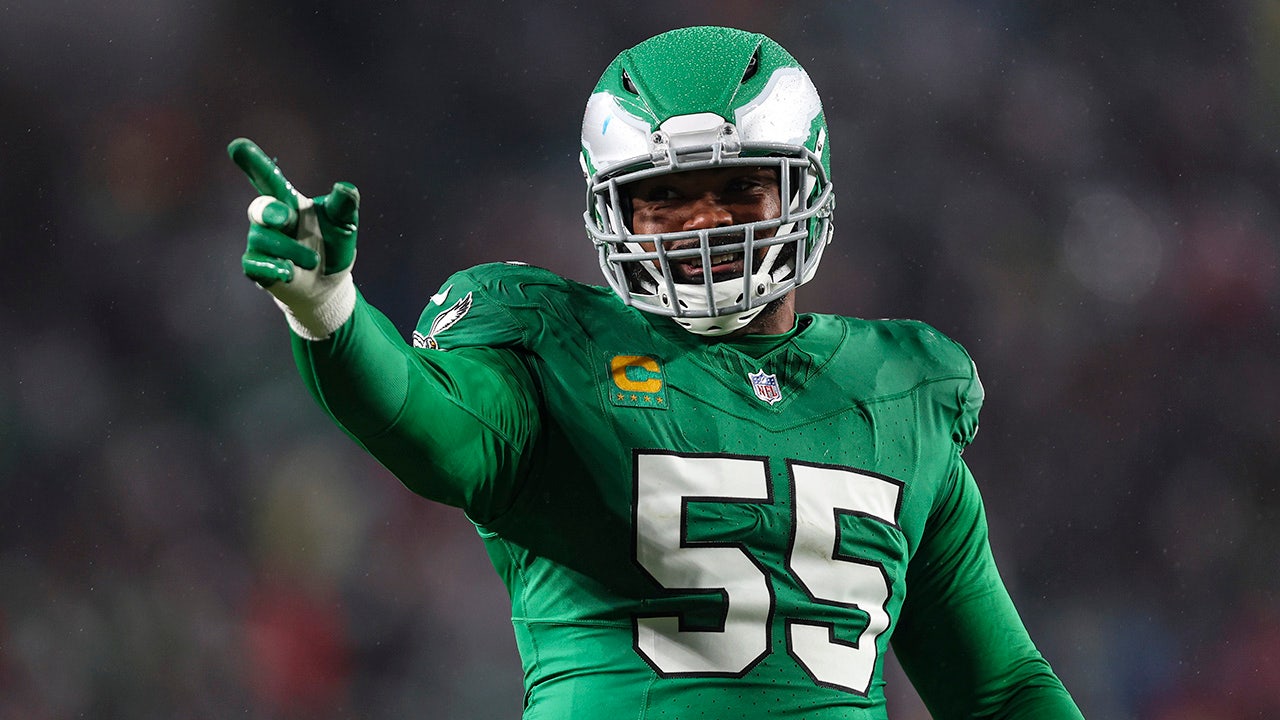
Philadelphia Eagles defensive end Brandon Graham took a shot at Dallas Cowboys fans on Friday night at the NFL Draft when he introduced his team’s second-round pick.
Graham came onto the draft stage in his native Detroit. He offered rousing cheers for his alma mater, Michigan, and the Eagles. Then, he set his sights on the Cowboys.
Eagles defensive end Brandon Graham during the Arizona Cardinals game on Dec. 31, 2023, at Lincoln Financial Field in Philadelphia. (Andy Lewis/Icon Sportswire via Getty Images)
“Y’all already know. All day, Dallas sucks! All day. Let’s go!” Graham said.
The Super Bowl champion then got serious before he announced the Eagles were taking defensive back Cooper DeJean out of Iowa.
“The Eagles have definitely changed my life and to be a part of this organization, going on my 15th year, I’m definitely excited to be able to announce this pick,” Graham said.
NFL DRAFT BETTING RECAP: ‘WE GOT KILLED ON PENIX GOING IN THE TOP 10’
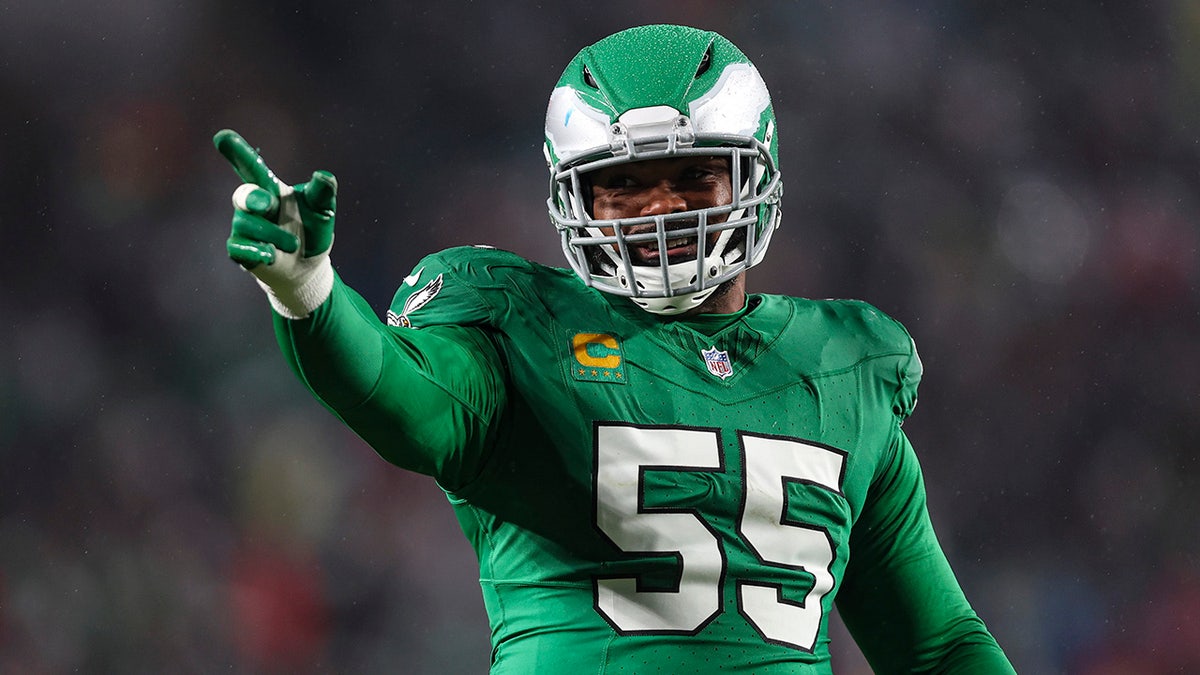
Brandon Graham of the Eagles reacts during the Buffalo Bills game at Lincoln Financial Field on Nov. 26, 2023, in Philadelphia. (Perry Knotts/Getty Images)
Philadelphia chose Graham with the No. 13 overall pick in the 2010 draft out of Michigan. He’s been a mainstay on the Eagles’ roster since then.
The veteran player has earned one Pro Bowl appearance over the last 14 seasons. He has 467 tackles and 73 sacks in that span. He may have only started three games since the start of the 2021 season, but his veteran presence is what keeps him on the Eagles roster.
Philadelphia added Bryce Huff and Devin White to its linebacking corps in the offseason. The team also has Nakobe Dean and Josh Sweat.
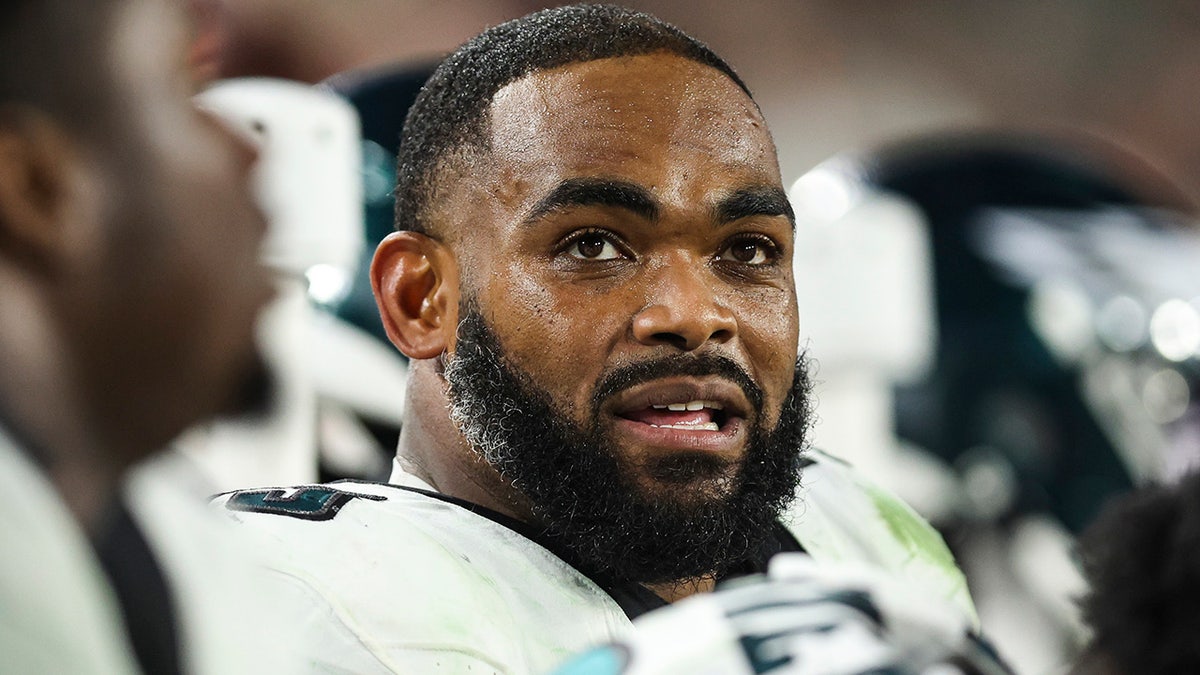
Brandon Graham of the Philadelphia Eagles on the sideline during the wild-card playoff game against the Buccaneers at Raymond James Stadium on Jan. 15, 2024, in Tampa, Florida. (Perry Knotts/Getty Images)
The Eagles were 11-6 last year.
Follow Fox News Digital’s sports coverage on X and subscribe to the Fox News Sports Huddle newsletter.
Sports
After consecutive home losses, Kings left grasping for any shreds of hope vs. Oilers
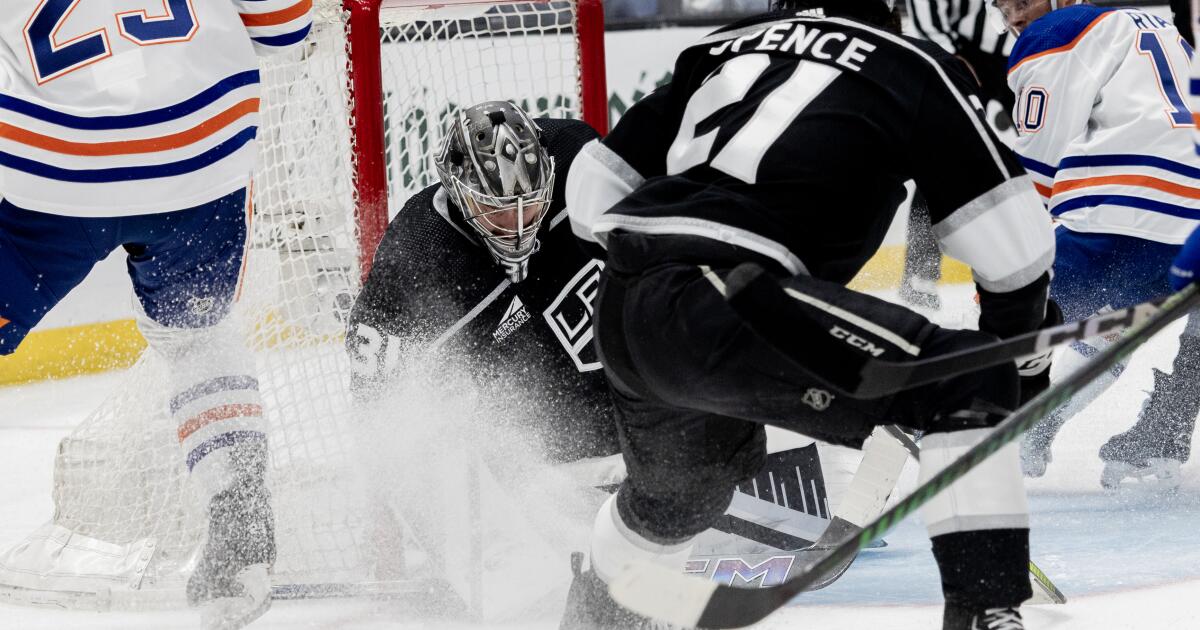
You don’t have to know anything about hockey to know the Kings are in trouble heading back to Edmonton for Game 5 of their first-round NHL playoff series with the Oilers.
Just knowing how to count is knowledge enough.
After Sunday’s 1-0 loss at the Crypt, the Kings trail the best-of-seven series three games to one. That makes Wednesday’s game a must-win for the Kings. So is anything that comes after that.
“Yeah, our back are against the wall,” center Phillip Danault said. “Nothing to lose. One game at a time. Pressure’s on them. Give everything you’ve got.”
A pained grin creased his face.
“All the cliches,” he said.
It doesn’t seem right that, after a regular season that started and finished in record-setting fashion, the Kings find themselves just a loss away from bowing out of the playoffs with a whimper, not a bang.
The Kings won their first 11 road games of the season under coach Todd McLellan, breaking the NHL record. Then, after McLellan was fired and assistant Jim Hiller was promoted to take his place in February, the team won eight in a row at home at the end of the season, matching the team’s longest home winning streak in 32 years.
Yet now, after back-to-back home losses, the Kings are a road loss away from a long offseason.
It wasn’t supposed to end like this, of course. Two years ago, in the first round of the playoffs, the Oilers eliminated the Kings in seven games. Last year they did it in six. Now it could happen in five.
After averaging nearly 3 ¼ goals at home during the regular season, the Kings scored once at the Crypt in two playoff games. The team isn’t progressing, it’s regressing. But it’s a hole the team dug for itself.
It’s once-vaunted penalty kill, second in the league during the regular season, has been torched in this series, with the Oilers scoring eight times in 15 man-advantage opportunities, the latest coming in the second period Sunday to decide Game 4. The Kings’ own power play, meanwhile, has been powerless, going 0 for 11, the latest whiff coming in the third period of Sunday’s loss when they didn’t even get off a shot.
The Oilers have scored 18 times in the four games and their big three of Zach Hyman, Leon Draisaitl and Connor McDavid have combined for 10 goals and 15 assists. Still the Kings aren’t dead yet (the vital signs, however, are really weak).
But as Danault, who apparently has never heard a cliché he won’t repeat, knows, the series isn’t over until it’s over.
In 2021, when he was in Montreal, the Canadiens lost three of their first four games in a first-round series with Toronto, only to rally with a pair of overtime victories that helped them win the series. That team made it to the Stanley Cup Final.
“So we’ve got to believe. And it’s got to be there,” Danault said.
If the Kings need any encouragement — and clearly they do — they may have gotten some in Sunday’s loss, because while the result wasn’t what they wanted, the performance was. The Kings outshot the Oilers 33-13; outplayed, outhit and outhustled them; and managed to stay out of the penalty box for most of the night.
They also rolled the dice by replacing goaltender Cam Talbot with backup David Rittich, who had an awful playoff record, having given up eight goals in 32 minutes. Rittich was near perfect Sunday, becoming just the fourth goalie to hold the high-octane Oilers to a goal or less in 39 games — a streak Rittich started when he shut Edmonton out in early February.
It was a template for a victory even if it ended in a loss.
“It’s the kind of game you’ve got to replicate,” Danault said. “That’s the only way you can win against Edmonton right now. We have to play the same exact way and that’s going to give us a big chance.”
“The preparation, the effort, it’s right there,” added Hiller. “So to summon that back up again. It’s not like we have to go and find that. It’s right there. So it should not be that difficult.”
Trevor Moore said it’s now a game of follow the leader.
“The leadership in this [locker] room is second to none,” he said. “It’s just game by game. It’s wake up, go to practice and, you know, just keep getting better.”
But those leaders have to show up on the ice, too — Moore included. He led the team with 31 goals and had 26 assists during the regular season, but he has just just a goal in the playoffs. And while captain Anze Kopitar has a goal and two assists in the series, all three points came in the same game. Then there’s Pierre Luc-Dubois, whom the Kings acquired last summer then signed to an eight-year, $68-million contract. He has just a goal in the series, didn’t take a shot in 35 shifts combined in the two home games and has just one shot in the last three games combined.
“The message is just stick with it. Stick with our game and play the same way and we’ll get rewarded,” Danault said. “Normally we do. So we’ve got to keep playing the same way and we’ll get rewarded next game, I guess.”
If they don’t, anyone who can count to four will be able to count the Kings out.
“Our backs are against the wall,” Danault repeated. “So nothing to lose.”
-

 Kentucky1 week ago
Kentucky1 week agoKentucky first lady visits Fort Knox schools in honor of Month of the Military Child
-

 News1 week ago
News1 week agoIs this fictitious civil war closer to reality than we think? : Consider This from NPR
-

 World1 week ago
World1 week agoShipping firms plead for UN help amid escalating Middle East conflict
-

 Politics1 week ago
Politics1 week agoICE chief says this foreign adversary isn’t taking back its illegal immigrants
-

 Politics1 week ago
Politics1 week ago'Nothing more backwards' than US funding Ukraine border security but not our own, conservatives say
-

 News1 week ago
News1 week agoThe San Francisco Zoo will receive a pair of pandas from China
-

 World1 week ago
World1 week agoTwo Mexican mayoral contenders found dead on same day
-

 Politics1 week ago
Politics1 week agoRepublican aims to break decades long Senate election losing streak in this blue state
